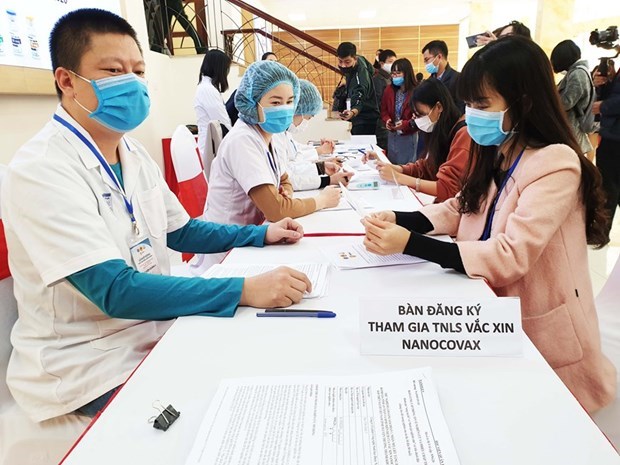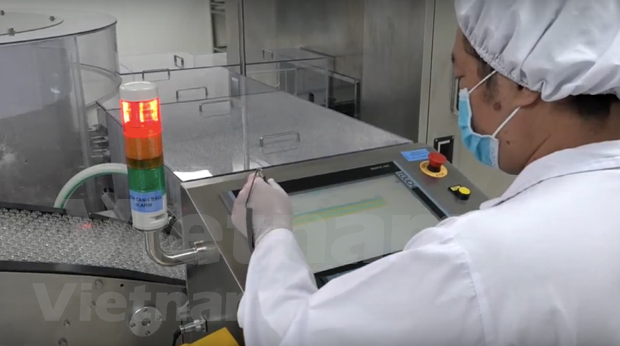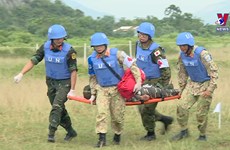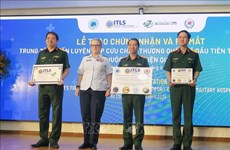Made-in-Vietnam COVID-19 vaccine likely to be put into use by late 2021
 A large number of volunteers travel to the Hanoi-based Military Medical Academy to sign up for the trial of COVID-19 vaccine Nanocovax (Photo: VietnamPlus)
A large number of volunteers travel to the Hanoi-based Military Medical Academy to sign up for the trial of COVID-19 vaccine Nanocovax (Photo: VietnamPlus)
Hanoi (VNA) – The Military Medical Academy on December 17 begins the first-phase human trial of made-in-Vietnam COVID-19 vaccine called Nanocovax.
The COVID-19 pandemic has been considered as a “nightmare” for the whole world in the past year, with more than 74 million cases being reported so far, of whom over 1.6 million died.
Many countries worldwide have worked to develop vaccines against the disease.
Over the past time, the Vietnamese health sector has kick-started the research system to develop vaccines with the involvement of four manufacturers, foreign experts and Vietnamese scientists.
The Military Medical Academy on December 17 begins the human trial of a made-in-Vietnam COVID-19 vaccine which is called Nanocovax. It is the first phase of the trial.
Prof. Dr. Do Quyet, Director of the Military Medical Academy, who is also head of the research studies on clinical trial of COVID-19 vaccine, spoke to VietnamPlus about this issue.
Reporter: How was the preparation for the clinical trial of the made-in-Vietnam COVID-19 vaccine made?
Prof. Dr. Do Quyet: The ethics council under the Ministry of Health (MoH) comprising of experts across the country convened and approved two important steps, which included preclinical trial following a preclinical trial on animals. The council concluded that preclinical trial on animals was safe and agreed to move onto human trials.
The preclinical trial that was previous approved by the ethics council was truly important.
In keeping with the schedule and guidance of the Minister of Health, the Military Medical Academy and the Nanogen Pharmaceutical Biotechnology JSC started the recruitment of volunteers for the trials.
Reporter: The vaccine research has been promptly carried out. How was infrastructure preparations made?
Prof. Dr. Do Quyet: The Military Medical Academy stands ready to ensure criteria set by the MoH, as inspection delegations of the ministry affirmed.
We already zoned off a separate area for injection, supervision and emergency. At present, all vehicles, devices and personnel are ready.
Reporter: How many persons will join the first phase and how will they be supervised?
Pro. Dr. Do Quyet: There will be two phases. The first phase is primarily for detecting the right amount of doses, safety assessment and immunity response. More steps will be carried out in the second phase as assessments continue.
In the first phase, we recruit 60 volunteers, dividing them into three groups for receiving three doses of 25 mcg, 50 mcg and 75 mcg.
Preclinical results indicated that all the three doses show immune response. To ensure safety for the patients and volunteers, we start from the minimum dose and the following injection will be conducted 28 days after the previous one.
Reporter: Which is priority in the first phase of Vietnam-made COVID-19 vaccine?
Prof. Dr. Do Quyet: We must be certain that the vaccine is safe for the participants. Therefore, the preparation, selection and appointed medical checkups have a great role to play.
After the first volunteers receiving the shots, we will closely keep an eye on their conditions and stand ready to handle situations so as to ensure their safety.
 The production of Nanocovax at the Nanogen Pharmaceutical Biotechnology JSC (Photo: VietnamPlus)
The production of Nanocovax at the Nanogen Pharmaceutical Biotechnology JSC (Photo: VietnamPlus)Reporter: In case the vaccine turns out to be unsafe, will the next phase be carried out?
Prof. Dr. Do Quyet: In my capacity as head of the research studies on clinical trial, I pledge that if the vaccine is unsafe, the trial will be ceased.
Reporter: If the human trial of COVID19 vaccine Nanocovax proceeds smoothly, when will it be released?
Prof. Dr. Do Quyet: If the situation goes well as we plan, the two phases will be completed by next February and the third one will begin. More volunteers will be needed for this phase and if it is a success, the vaccine is likely to be put into use by late 2021.
The clinical trial, therefore, may take about one year, and it is rather quick compared to the rest of the world. But we do not exchange anything for citizens’ safety as it is the utmost priority.
Even until the vaccine is fully ready, people still need to closely observe health regulations. We must take the initiative in curbing the spread of the pandemic.
Reporter: Thank you so much!













